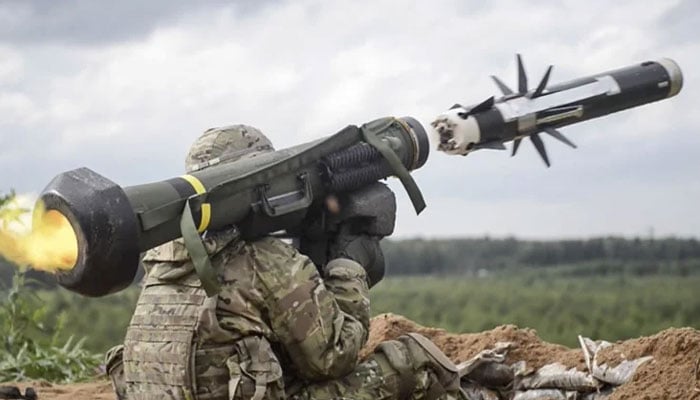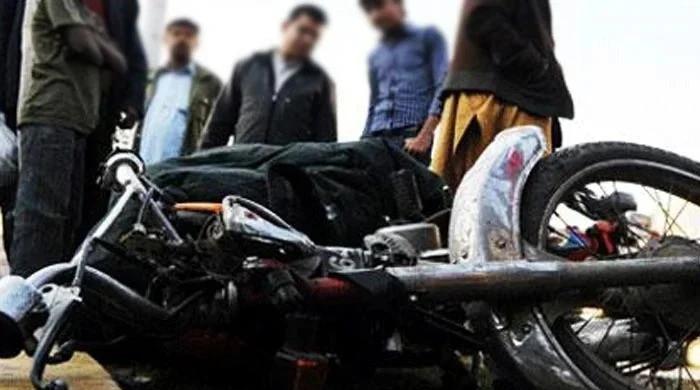Terror threat: 'TTP acquires US-made anti-tank Javelin missiles'
Video released by group linked to TTP shows terrorists training with missiles having "fire-and-forget" capability
April 09, 2025

- No confirmed evidence of missiles in Pakistan, says official.
- He warns that terrorists can deploy Javelin missiles anywhere.
- Missiles can be used to target military posts, breach border.
PESHAWAR: In a worrisome development for Pakistan on the security and terror threat front, the outlawed Tehreek-e-Taliban Pakistan (TTP) have acquired United States-made anti-tank missiles, including the US-made FGM-148 Javelin, The News reported on Wednesday.
A video released by a group linked to the banned TTP, shows militants undergoing training with the Javelin missile, which is renowned for its "fire-and-forget" capability.
Once launched, its advanced infrared guidance system automatically tracks and engages targets — such as enemy tanks, armoured vehicles, and fortified positions — allowing the operator to immediately retreat to safety.
A security official told The News that there is no confirmed evidence of these missiles being present in Pakistan.
The real concern is that the terrorists now possesses this capability, which they could deploy anywhere in Pakistan if they choose.
The official emphasised that this situation not only reflects the Afghan government’s failure to secure the US Army’s abandoned weapons but also raises the alarming possibility that these missiles could be used to target Pakistani military posts and breach the border fence along the Pakistan-Afghanistan border.
The FGM-148 Javelin, manufactured in the US at an estimated cost of around $200,000 per unit, is designed to destroy enemy tanks, armoured vehicles, and fortified structures.

Its "fire and forget" capability means that once the missile is launched, it autonomously homes in on its target using an advanced infrared guidance system. This technology allows the operator to immediately move to a secure location after firing, reducing personal risk on the battlefield.
Security sources said the possession and potential use of such sophisticated weaponry by TTP-affiliated groups significantly heightens the threat level in the region.
Experts warn that the introduction of these missiles into militant arsenals could escalate violence in Pakistan.
The alarming revelation comes days, after Foreign Minister Ishaq Dar on Monday held the first telephonic conversation with US Secretary of State Marco Rubio, held a telephonic conversation regarding the issue of military equipment left behind in Afghanistan after the withdrawal of US forces.
Pakistan witnessed a sharp increase in terror attacks in January 2025, surging by 42% compared to the previous month, according to data released by the Pakistan Institute for Conflict and Security Studies (PICSS), a think tank.
Also, the Global Terrorism Index 2025 report has highlighted a coinciding significant increase in terrorism in Pakistan and the rise of Afghan Taliban to power in Kabul.
Noting that the militant groups operating from Afghanistan have intensified their attacks, particularly along the Pakistan-Afghanistan border, the report said that the TTP remained the deadliest terrorist group in the country, accounting for 52% of all terrorism-related deaths.
The outlawed outfit carried out 482 attacks in 2024, which led to 558 deaths. The attacks carried out by the groups doubled in the previous year coupled with a 90% increase in deaths.
According to a report by the US Department of Defence in 2022, the US left behind $7 billion worth of military equipment in Afghanistan which was quickly seized by Afghan Taliban fighters as they swept the country.
The US forces tried to dismantle or destroy as much of their machinery as they could in the last weeks of their chaotic pull-out. However, huge amounts still fell to the Afghan Taliban in August 2021.
However, the Taliban reportedly refused to return any of the military equipment and urged the US to provide them with more advanced weapons to fight Daesh.
The issue of weapons proliferation was recently corroborated in a report by the Small Arms Survey — a Geneva-based organisation.
The report, titled "Documenting Arms Availability in Afghanistan", highlights the ongoing arms trafficking in the region, revealing that both Soviet-era and NATO-pattern weapons remain accessible in informal markets despite efforts by the Taliban to control arms distribution.
Field investigations conducted between 2022 and 2024 focus on arms availability, prices, and trafficking dynamics in Afghanistan’s eastern provinces.
These weapons are regularly diverted to non-state armed groups, including the Tehreek-e-Taliban Pakistan (TTP) and al-Qaeda, raising concerns about regional security.
As per the report, the availability of small arms, light weapons, and ammunition in the border regions has shifted significantly since the Taliban's takeover in 2021.
The report found that NATO-pattern weapons, such as M4 and M16 rifles, have seen a substantial price increase, with M4s rising by 13% and M16s by 38% in Afghanistan’s Nangarhar and Kunar provinces.











